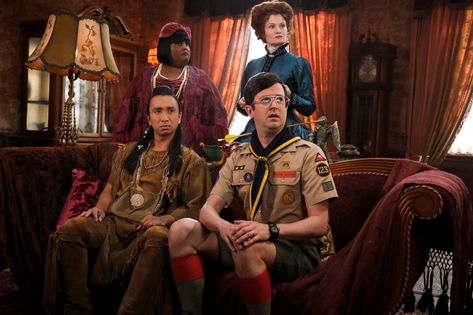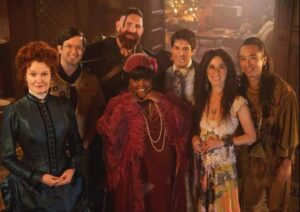
It may be cooler to live on the edge and thrive on spontaneity, but inevitably, we will seek out some form of familiarity and alleviation.
We want to see the same people and places because they make us feel warm and happy. We may even take advantage of this feeling of hominess; assuming it will always be there… until it’s not.

Ghosts, the CBS comedy based on the equally delightful British TV series, is my comfort TV. Although there are some living humans on the show—chiefly, Rose McIver’s Sam, who can see and speak to the dead after suffering her own near-death experience, and her husband, the very much not clairvoyant Jay (Utkarsh Ambudkar)—most of these characters are just where I left them last week. This is because these spirits who represent different parts of history (the American Revolution; the destruction of Native lands; the Jazz Age, ‘80s-era National Lampoons-like goofiness…) cannot leave. They are forced, for some strange reason not made clear to either them or the audience, to spend eternity within the confines of what is now known as Sam and Jay’s sometimes-floundering bed and breakfast, Woodside Manor.
There’s so much comfort in the familiar that it’s easy to take advantage of it.
The show’s second season ended with a cliffhanger. One, or maybe more, of my dearly departed friends seemed to have been “sucked off” (Ghosts parlance for going into the light and leaving this purgatory for another dimension. The show has a surprising amount of sexual innuendos for being a CBS sitcom).
The third season premiere, which aired last night, revealed that the unshackled was Sheila Carrasco’s Flower, a hippie who was so into free love that it killed her (she tried to hug a bear).

Flower’s absence is established fairly quickly, which means the latter part of the episode is devoted to the ghosts asking a lot of the questions that we livings regularly wonder, especially in the last few years: Why her? Why not me? Where did she go? How do we make our time here count? Is reincarnation real? (Flower’s boyfriend, a Viking ghost named Thor played by Devan Chandler Long, is convinced she’s been reincarnated as an owl because “love for owls first thing Flower and Thorfinn find in common”).
It also brings about interesting theological and metaphysical debates. Can ghosts feel sadness, love, and loss? Can they experience trauma and frustration and anger? Do these traits that make us human go away when we die?
The season also discusses what one would have to do to warrant a personality breakthrough, and what it means to be a “good” person. A cute B storyline in the premiere focuses on the class system rivalry between the main ghosts (i.e. those who are allowed to “live” upstairs in the manor) and the smelly and socially awkward spirits of 19th century cholera victims who are relegated to spend eternity in the basement, staring at the water heater. (Or the “potato sack wearing hobgoblins,” as Rebecca Wisocky’s Gilded Age-era ghost, Hetty, insinuates). Richie Moriarty’s Pete, a cheerful and polite travel agent who was struck in the neck by an arrow while leading a scouting expedition, involuntarily wonders if the person who was sucked off was “just a basement ghost.” This creates a domino effect that eventually makes him accept that, sometimes, the only way to keep order is to have people not like you.

But it also shows that life, even if you’re a ghost, has to go on. The episode sets up new stories for the season, such as Sam and Jay’s attempt to open a restaurant on the property. It gives hope to the future, by promising the nuptials of Revolutionary War captain Isaac Higgintoot (Brandon Scott Jones) and the man he killed, British officer Nigel Chessum (John Hartman). And the season premiere sends Flower off with a memorial that offers closure not just for Thor, but for everyone who loved her, including Sam.
Like these characters, I will miss Flower in all of her saucer-eyed wonderment and determination to befriend butterflies. I loved that her backstory wasn’t just that she’d lived in a cult, but that she had ended up there because she had also suffered loss in her life. And I get Sam’s predicament of wanting to help the ghosts pass on, but also not wanting to lose her friends. How can life, and afterlife, not have meaning if we don’t know it can be taken away?
I don’t think Flower will be forgotten. And, the show being what it is, I’m not even sure if she’ll be gone forever (or at all). But I do like that a program as comfortable and familiar as this one can continue to make us think and grow.
